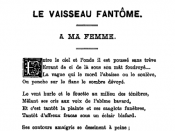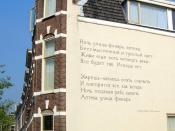"Still I Rise" is set during the apartheid, which was a period in history when the black people from America were segregated from the white people. This led to the lack of freedom, which is shown through the poem. "Warning" is about a young woman thinking about how her life will be in the future, and how she will have no freedom and follow the original stereotypes for old people.
The title shows a great deal about the lack of freedom that the author has experienced; "Still I Rise". The first impression the reader gets from the title is that the author has been oppressed, and has had a lack of freedom. We can see that from the word "Still" it implies that the narrator has suffered oppression a number of times, however, continues to rise above it.
In comparison, the poem "Warning" does not imply anything to the reader about what the poem is about.
However, as the title is ambiguous, it makes the reader want to read the poem to find out what it is about.
The language used shows that there is a lack of freedom throughout the poem; "I'll Rise". The repetition of the words "I Rise" at the end of three stanzas highlights that the narrator rises above the oppression she has faced in her life. We can also see that wherever Angelou uses the phrase; "I Rise", it is preceded by; "But still, like dust, I'll Rise". Throughout the stanza, the narrator talks of the oppression she has faced and then shows at the end that she will not be affected by any of it. The simile highlights that she will rise uncontrollably, in the same manner as dust rises. The actual language used in the poem is quite simple,



A Reader's thoughts.
When a writer makes a claim, he/she should be sure to provide ample support for his arguments. If a writer believes a reader should feel or think a certain way, he/she should explain why. For example, the writer's statement, "In comparison, the poem "Warning" does not imply anything to the reader about what the poem is about. However, as the title is ambiguous, it makes the reader want to read the poem to find out what it is about.", is completely subjective. When I read the essay, I had several ideas about what "Warning" meant, even if I hadn't read the poem. "Warning", in this context, if I were to compare it to "Still I Rise", would mean something to me. Perhaps a vision of things to come. Perhaps inciting change to bring about progress. Or perhaps if I DON'T change, things will remain the same and stagnant. "Warning" actually implies MANY things. According to the writer, it implies nothing. Poetry is nothing BUT implication. Once that is understood, it will be easier for the writer to arrange his/her arguments in such a way that he/she can make cogent, fresh insights about his/her subject matter. That is, the writer will be able to better explain to the reader why it is important to study such masterful works. The Writer will explain not only what the poems mean, but how they are meaningful!
In the conclusion, the writer hints at how the poems are meaningful, but lacks the candor and finesse found in good writing. "The two poems differ, in the fact that in "Still I Rise", the woman wants to break the stereotypes, and oppression. However, in "Warning" the woman would much rather conform to the stereotypes, even though she does not want to." suggests the writer understands a need for a thematic quality ("the woman wants to break the stereotypes and oppression"). However, the writer never finishes the job. The writer fails to reveal why it is important to change. The writer fails to connect the two poems in a thematic, universal and unified idea. Instead, the writer regurgitates what the poems mean and how the author of the poems convey these meanings through literary devices. Although it is important to recognize the varied techniques and author chooses to use to create style, it is insignificant if it cannot be linked to an overarching theme. An author uses these devices to enhance meaning, to reveal an attitude or tone, or suggest a message - a change in this case. Can a reader honestly believe that although the author of "Warning" wrote about an old woman who conforms to stereotypes, that the author actually SUGGESTS we should conform to stereotypes? Absolutely not. "Why" do you ask? Because of the context in which the title "Warning" is used. THAT's WHY.
Hopefully, the next paper will be able to bridge commentary with quotes from the text with a statement as to WHY the text is meaningful.
0 out of 0 people found this comment useful.